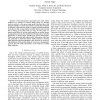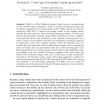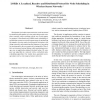287 search results - page 2 / 58 » Distributed Sleep-Scheduling Protocols for Energy Conservati... |
BROADNETS
2007
IEEE
13 years 11 months ago
2007
IEEE
— Power-management approaches have been widely studied in an attempt to conserve idling energy by allowing nodes to switch to a low-power sleep mode. However, due to the inherent...
TMC
2012
11 years 7 months ago
2012
WiFi interface is known to be a primary energy consumer in mobile devices, and idle listening (IL) is the dominant source of energy consumption in WiFi. Most existing protocols, s...
HPCC
2005
Springer
13 years 10 months ago
2005
Springer
S-MAC is a MAC (Medium Access Control) protocol as specialized for the wireless sensor network in order to sacrifice transmission delay and extend the working life of the whole sen...
TCOM
2010
13 years 3 months ago
2010
In wireless multi-hop packet radio networks (MPRNs) that employ geographic transmissions, sleep schedules or node activation techniques may be used to power off some nodes to cons...
DATE
2005
IEEE
2005
IEEE
LORD: A Localized, Reactive and Distributed Protocol for Node Scheduling in Wireless Sensor Networks
13 years 7 months ago
The lifetime of wireless sensor networks can be increased by minimizing the number of active nodes that provide complete coverage, while switching off the rest. In this paper, we ...



